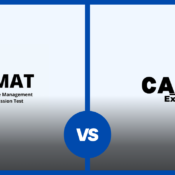
Second MBA: Your Gateway to a Global Career
You have done your MBA, have a job with a growth trajectory laid out for you and a promise of a greater pay with time. Despite this, you feel something is missing. This can be dissatisfaction with your current role, industry, lack of satisfactory growth, or simply the lingering desire to acquire a degree from a more prestigious institution. One prominent solution to this situation is a second MBA degree. Some people in India and worldwide have done their first MBA after pursuing the first one, usually in their home country, and opt for a second one in the home country or abroad. This is a growing trend, driven by several factors. In this article we try to decode the growing popularity behind the second MBA and whether it is a good fit for you.
Why are people going for a second MBA?
1. Career stagnation
Many people are unable to progress beyond a certain position in their company and want to acquire the required specialization in order to achieve the required growth. For a large number of them, acquiring a second MBA from a reputed school is the solution.
2. Desire to acquire a good brand name
Many a time, people go for a first MBA straight after graduation and are unable to crack a school of their choice. They enter the workforce soon after, with lesser compensation and exposure, but the desire for a more reputed brand name, network, and opportunities that come along with it still eludes them. To gain access to the same, they usually want to do a second MBA.
3. Desire to switch industries
Sometimes people are stuck in fields or companies they do not enjoy working in or working for. They have their first-degree MBA basis of perception, but the reality was otherwise for them. Consequently, they want to expand their options and specialize in another field so that there are more options available to them. In fact, it can be a career-saver for many aspirants.
4. Lack of prior work experience
Related to the earlier point, many students in India jump on the MBA bandwagon with little to no work experience, mainly due to the tough job market, and employment insecurity. Many a time they are not satisfied with the work experience and wish to alter their career trajectory. They realize they could have done much better in another field and a second MBA serves as a launchpad to an alternative path.
5. Desire to do better
The desire to make a significant impact in their industry requires in-depth knowledge and dedication. A second MBA provides the requisite knowledge, expertise, and network for making the desired impact. Also, given the cut-throat private sector job opportunities, having a good brand name on your CV certainly opens doors.
6. Global Exposure & Real-World Education
Most local MBA programs tend to be very theoretical in their approach which results in some students lacking in practical knowledge. This can be a hurdle to their professional careers as increasingly companies want their employees to hit the ground running and are investing lesser time and money on inhouse training. The practical approach to business education offered by some global programs can thus be a strong proposition for such students.
Additionally, with increasing globalization large companies often expect a global mindset since their employees will be working in multicultural teams across geographies. In such cases, having a global mindset can be a key recruiting criterion for some large multinational employers. Hence, some students who want to tap into these global opportunities are tempted to consider a second MBA to build a global career.
Is a second MBA the right option for you?
While this is your individual choice, we can help you make the right choice by helping you answer the correct questions. Some of these include:
1. An MBA abroad is usually expensive, for which students usually have to take a loan or apply for scholarships (also read: how to finance your MBA). If you have already taken a loan or have immense financial pressure, then this is a factor you must consider.
2. Preparing for an MBA abroad is an arduous task. Are you willing to devote the time and energy needed to prepare for GMAT or GRE, build your profile, frame essays, and collect letters of recommendation among many other things.
3. It will come with an opportunity cost, that is, you will have to devote one or two years of your professional life to a business school degree. If you are certain, it will help you advance your career, then a second MBA is the right choice for you.
4. Is it necessary for you to do an MBA or can some other specialization help you better to fulfil your aspirations?
5. You will also have to debate between a one and a two-year program, and which one suits you (also read: one-year or two-year MBA).
These are questions you will have to answer not just for yourself, but also in your admission essays and MBA interviews. It is better to ponder these questions before you come up with good answers that will convince the admissions committee. (Tip: While convincing the admissions committee to focus on the ‘why’ of ‘Why you want to do a second MBA’, as this is a question which will surely come up).
Which Schools to Target?
There are some schools that accept applicants for a second MBA and some that don’t. It is important to be aware of them before you file your application. Some of the ones that do accept an application include, Michigan Ross, Wharton, and MIT Sloan. In a similar light, there are some that accept the applications conditionally. For example, the Darden School of Business (University of Virginia) does not admit students who have already completed their first MBA from an AACSB (Association to Advance Collegiate Schools of Business) accredited institution. Kellogg (Northwestern) accepts applications for their one-year accelerated MBA, if this is your second MBA. The Goizueta Business School (Emory) offers admission based on a case-by-case basis subject to various factors like the location of your previous business school, etc. At the same time, there are some that do not accept second-time MBA aspirants, namely, Haas (UC Berkeley), Owen (Vanderbilt), Dartmouth (Tuck), and Fuqua (Duke).
A second MBA from a top school will certainly boost your profile, and adcoms understand that. The question is how much are you willing to invest in terms of finance and time.



